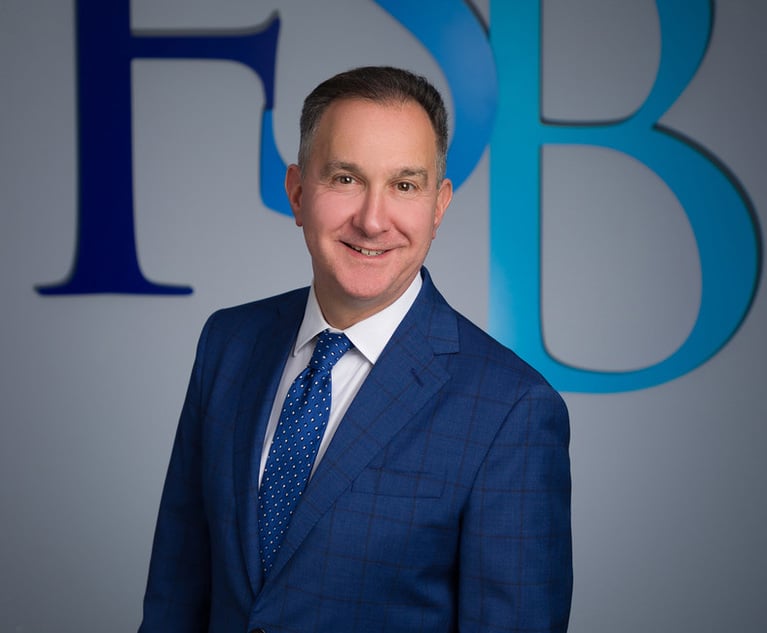 New Jersey Appellate Division Judge Michael Haas. Photo by Carmen Natale
New Jersey Appellate Division Judge Michael Haas. Photo by Carmen Natale'Obesity Alone Is Not Protected,' Appeals Court Says in Rejecting Bus Driver's Discrimination Claim
In essence, the ruling affirms that, under the New Jersey Law Against Discrimination, "obesity alone is not protected ... as a disability unless it has an underlying medical cause, a condition that plaintiff failed to meet in the present case."
April 04, 2019 at 10:01 PM
6 minute read
An appellate court has upheld a decision to dismiss a Paterson man's claim that he lost his job as a bus driver and was subjected to a hostile work environment because of morbid obesity.
In essence, the ruling affirms that overweight citizens are not necessarily a protected class under the New Jersey Law Against Discrimination—that “obesity alone is not protected under the LAD as a disability unless it has an underlying medical cause, a condition that plaintiff failed to meet in the present case.”
The decision upheld summary judgment granted on April 30, 2018, by Passaic County Superior Court Judge Ernest M. Caposela, who found that plaintiff Corey Dickson failed to support his discrimination claims and dismissed his complaint against Community Bus Lines, Inc., two former supervisors and a medical doctor.
The case was argued on March 25 before Appellate Court Judges Jack Sabatino, Michael Haas and Stephanie Ann Mitterhoff.
In the April 4 ruling, the court said Dickson's complaint was properly dismissed “because a perceived disability claim based on obesity must be grounded upon direct or circumstantial evidence that defendants perceived the plaintiff to be disabled due to a medical condition that caused him or her to be overweight.
“Such proof is absent from this record and, accordingly, summary judgment was correctly granted,” wrote Judge Haas, who delivered the opinion.
Attorney Mark Mulick of Montclair, who represented Dickson, expressed disappointment over the ruling.
“We are extremely disappointed,” Mulick said in a phone interview. “It appears that obesity is now the only legally accepted form of workplace discrimination. I simply do not understand how alcoholism can be an LAD-protected disability and obesity is not. An alcoholic drinks too much and an obese person eats too much. What is the difference?
“My client suffered a decade of obesity taunts on an almost daily basis, and his supervisors ran on it,” added Mulick. “He had no one to go to but the courts, and now he doesn't have that.”
Attorney Christina A. Stoneburner of Fox Rothschild in Morristown, who represented the defendants, declined to comment.
The court denied Dickson's only remaining claim that he pressed on appeal—that he was subjected to a hostile work environment with repeated taunts over his weight by former colleagues and supervisors.
According to the decision, Dickson weighed more than 500 lbs during his time working for the company. He had been a bus driver since 2005 for Community, where he drove a regular route and passed his mandatory medical examinations from 2005 to 2015.
In his complaint, Dickson asserted claims under the LAD alleging his former employer and immediate supervisors discriminated against him based on his weight, failed to adequately accommodate his physical size, retaliated against him, and subsequently fired him from his job.
Defendant Community denied it discriminated against Dickson, and contended that he had failed two medical examinations that were required in order for him to get re-certified and obtain a valid commercial driver's license (CDL). Community said all CDL holders have to pass a medical exam every two years and obtain a medical certification card verifying their fitness to drive.
The bus company maintained that Dickson failed a medical exam in April 2015, which disqualified him from driving a bus. Community said it encouraged him to seek another medical opinion over his condition, which he declined, but it still kept his job open in hopes of him eventually getting re-certified, according to the decision.
Dickson filed his complaint against Community and the other defendants in February 2016.
In July 2017, Dickson suffered a stroke. The following year, he was diagnosed with peripheral edema, obstructive sleep apnea, morbid obesity, chronic congestive heart failure, among other conditions, the court said.
In granting summary judgment, Judge Caposela rejected Dickson's claim that his obesity constituted a disability under the LAD, and that the defendants had subjected him to a hostile work environment because of his weight
Relying on the Appellate Division's 2015 decision in Schiavo v. Marina District Developmental Co. LLC, Caposela said “there is no protected class [under the LAD] based solely on one's weight.” The judge also found that contrary to Dickson's claim, the defendants never perceived Dickson as “disabled.”
Judge Haas, affirming, said, “as the Supreme Court held in Viscik v. Fowler Equipment Co., a plaintiff's obesity will only constitute a disability under the LAD if the plaintiff demonstrates that his condition is 'caused by bodily injury, birth defect, or illness.'”
As for Dickson's claim for a hostile work environment based upon perceived disability under the LAD, Haas said Dickson also failed to substantiate that the remarks allegedly made about him interfered with his work driving a bus. The alleged comments were in line with comments he made about himself, the court said, and the ruling referenced how Dickson made self-deprecating remarks about his weight among colleagues in the break-room, calling himself “fat boy,” among other names.
“Until he was unable to secure a medical certification card, plaintiff was a valued employee who received several commendations,” Haas said. “Community never fired plaintiff, and kept his job open in the hope that he would be able to pass his licensing examination.
“Under the totality of these circumstances, we agree with [Caposela] that the cumulative effect of the coworkers' comments was not sufficiently 'severe or pervasive' to create an actionable hostile work environment claim under the LAD.”
Added Haas: “To prevail on a hostile work environment claim, a plaintiff must show: One, that he or she is in a protected class; two, that he or she was subjected to conduct that would not have occurred but for that protected status; and three, that it was severe or pervasive enough to alter the conditions of employment. Victor v. State.”
“Here, plaintiff did not establish that defendants viewed him as anything other than obese, which is not a protected class under the LAD,” Haas wrote.
This content has been archived. It is available through our partners, LexisNexis® and Bloomberg Law.
To view this content, please continue to their sites.
Not a Lexis Subscriber?
Subscribe Now
Not a Bloomberg Law Subscriber?
Subscribe Now
NOT FOR REPRINT
© 2024 ALM Global, LLC, All Rights Reserved. Request academic re-use from www.copyright.com. All other uses, submit a request to [email protected]. For more information visit Asset & Logo Licensing.
You Might Like
View All
Hit by Mail Truck: Man Agrees to $1.85M Settlement for Spinal Injuries

$945K Settlement Reached in Fatal Crash After Truck Driver Fell Asleep at Wheel
3 minute read
'That's Insane': Lawyers Weigh In on Fallout From Uber's User Agreement
7 minute read
NY's Top Court Mulls Fate of Personal Injury Claims Against NJ Transit Corp.
Trending Stories
- 1Fulton Judge Weighs Whether to Order Fani Willis to Comply With Lawmakers' Subpoenas Over Trump Case
- 2Lawyers Drowning in Cases Are Embracing AI Fastest—and Say It's Yielding Better Outcomes for Clients
- 3Judge Rises to Tifton Superior Court Bench
- 4'It's Like They Lynched You:' Law Professor's Discrimination Claim Reaches High Court
- 5New Teeth for Anti-SLAPP Statute? Absolute Immunity for Union Grievance Proceedings
Who Got The Work
Michael G. Bongiorno, Andrew Scott Dulberg and Elizabeth E. Driscoll from Wilmer Cutler Pickering Hale and Dorr have stepped in to represent Symbotic Inc., an A.I.-enabled technology platform that focuses on increasing supply chain efficiency, and other defendants in a pending shareholder derivative lawsuit. The case, filed Oct. 2 in Massachusetts District Court by the Brown Law Firm on behalf of Stephen Austen, accuses certain officers and directors of misleading investors in regard to Symbotic's potential for margin growth by failing to disclose that the company was not equipped to timely deploy its systems or manage expenses through project delays. The case, assigned to U.S. District Judge Nathaniel M. Gorton, is 1:24-cv-12522, Austen v. Cohen et al.
Who Got The Work
Edmund Polubinski and Marie Killmond of Davis Polk & Wardwell have entered appearances for data platform software development company MongoDB and other defendants in a pending shareholder derivative lawsuit. The action, filed Oct. 7 in New York Southern District Court by the Brown Law Firm, accuses the company's directors and/or officers of falsely expressing confidence in the company’s restructuring of its sales incentive plan and downplaying the severity of decreases in its upfront commitments. The case is 1:24-cv-07594, Roy v. Ittycheria et al.
Who Got The Work
Amy O. Bruchs and Kurt F. Ellison of Michael Best & Friedrich have entered appearances for Epic Systems Corp. in a pending employment discrimination lawsuit. The suit was filed Sept. 7 in Wisconsin Western District Court by Levine Eisberner LLC and Siri & Glimstad on behalf of a project manager who claims that he was wrongfully terminated after applying for a religious exemption to the defendant's COVID-19 vaccine mandate. The case, assigned to U.S. Magistrate Judge Anita Marie Boor, is 3:24-cv-00630, Secker, Nathan v. Epic Systems Corporation.
Who Got The Work
David X. Sullivan, Thomas J. Finn and Gregory A. Hall from McCarter & English have entered appearances for Sunrun Installation Services in a pending civil rights lawsuit. The complaint was filed Sept. 4 in Connecticut District Court by attorney Robert M. Berke on behalf of former employee George Edward Steins, who was arrested and charged with employing an unregistered home improvement salesperson. The complaint alleges that had Sunrun informed the Connecticut Department of Consumer Protection that the plaintiff's employment had ended in 2017 and that he no longer held Sunrun's home improvement contractor license, he would not have been hit with charges, which were dismissed in May 2024. The case, assigned to U.S. District Judge Jeffrey A. Meyer, is 3:24-cv-01423, Steins v. Sunrun, Inc. et al.
Who Got The Work
Greenberg Traurig shareholder Joshua L. Raskin has entered an appearance for boohoo.com UK Ltd. in a pending patent infringement lawsuit. The suit, filed Sept. 3 in Texas Eastern District Court by Rozier Hardt McDonough on behalf of Alto Dynamics, asserts five patents related to an online shopping platform. The case, assigned to U.S. District Judge Rodney Gilstrap, is 2:24-cv-00719, Alto Dynamics, LLC v. boohoo.com UK Limited.
Featured Firms
Law Offices of Gary Martin Hays & Associates, P.C.
(470) 294-1674
Law Offices of Mark E. Salomone
(857) 444-6468
Smith & Hassler
(713) 739-1250






